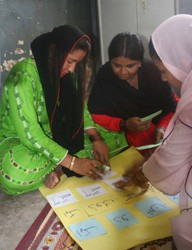
Sughra Hanif, a woman from a neighborhood called Lyari in Karachi, Pakistan, used to bring along one of her 10 children whenever she went out so they could read her bus schedules and numbers. “Otherwise I couldn’t leave the house,” she said. Hanif, who had never gone to school, moved to Karachi from a village in 1988. “My children would ask me to help them with their homework. I couldn’t,” she said. In 2005, Hanif joined a USAID family literacy center at a government school. She became one of 3,658 women who graduated from one of the 78 USAID-funded literacy centers in Islamabad, Rawalpindi, and Karachi. The afternoon classes, run in cooperation with local education officials, help mothers tie in basic literacy and math learning with their children’s lessons.
Led by USAID-trained government teachers, the 1.5-hour classes are held twice weekly for six months. Some students continue advanced lessons for another six months. They develop greater self-confidence and poise by practicing speaking and listening skills in addition to reading, writing, and math. Mothers share homework with their children and borrow books to read together. The new skills directly impact their quality of life. “I told them if you study, you can read bus numbers, you can tell the expiration date on your kids’ medications, and you can dial the phone yourself so that public calling places can’t cheat you with wrong numbers,” said Hafiza Nagori, a literacy master trainer.
In fact, Hanif, who does sewing work for extra income, has even become a more efficient seamstress. “I used to measure and cut out cloth by laying another cloth on top,” Hanif said. “Now I can use measuring tape and write the measurements down. It makes my work go faster.” She tracks her income and expenses more accurately and recognizes the letters spelling out medications for her children. A native Seraiki speaker, she has also improved her Urdu, Pakistan’s national language, and the only way to communicate with Pathan, Punjabi, and Sindhi neighbors in diverse Lyari. She no longer needs help to go out.
“My husband is happy because I can do my work by myself and don’t have to drag him along.” And her children get help with their homework. “What I don’t know I learn from them,” Hanif said. “What they don’t know, they learn from me.”







Comment
Make a general inquiry or suggest an improvement.